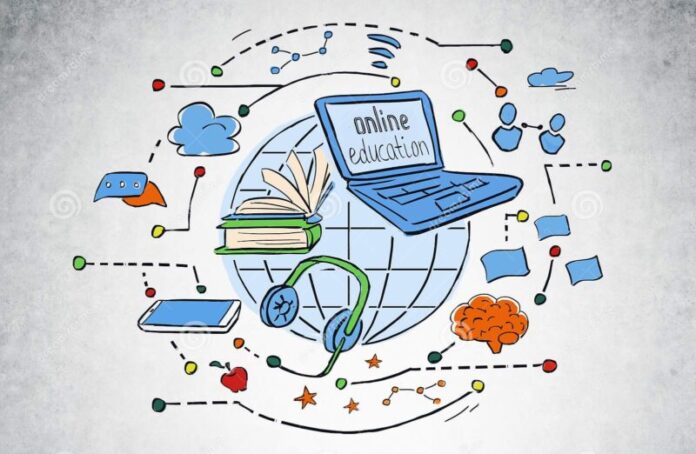The final version of the National Education Policy (NEP), approved without parliamentary discussion or public feedback, carried a last-minute addition of six pages that was different from the version last released in December 2019. These six pages were dedicated to the promotion of digital and online education. On 1st May 2020, the Prime Minister had reviewed the policy saying that online education will be the core of the NEP which is aimed at making India a “global knowledge superpower”.
 In July, Google’s CEO Sundar Pichai announced that he would invest Rs 33,737 crores for 7.7 percent stake in Ambani’s Jio Platform. This announcement was soon followed by a virtual meeting between the Prime Minister and Pichai where he discussed possibilities for investment in online education. The eagerness of Google to invest billions of dollars in order to “digitize” India is in the potential that it sees in monetizing online education, as outlined in a 2017 report. The proof of this burgeoning business is in the recently revised UGC guidelines, which mandates final examinations to be held online, even as seven state governments had decided against it. This move is based on the business interests of online education companies.
In July, Google’s CEO Sundar Pichai announced that he would invest Rs 33,737 crores for 7.7 percent stake in Ambani’s Jio Platform. This announcement was soon followed by a virtual meeting between the Prime Minister and Pichai where he discussed possibilities for investment in online education. The eagerness of Google to invest billions of dollars in order to “digitize” India is in the potential that it sees in monetizing online education, as outlined in a 2017 report. The proof of this burgeoning business is in the recently revised UGC guidelines, which mandates final examinations to be held online, even as seven state governments had decided against it. This move is based on the business interests of online education companies.
The most urgent and widely discussed problem posed by online education and examinations is that of access. In June, a 14-year-old Dalit girl, Devika, committed suicide due to the uncertainty and distress of lacking access to online education. Recent student protests against online exams have also highlighted the lack of access to high-speed internet in highly regulated areas like Kashmir, besides the problems with access to technology that is the reality for the majority of the country’s population.
Alienated personal digital spaces
However, NEP whose buzzword is ‘inclusivity’, does not make the problematic system of education more equitable. Even in the ideal case scenario, if every corner of the country had access to a 4G or 5G internet connection, and if 100 percent of the population owned a smartphone and a laptop, how would going online transform education as we know it today? The RSS-BJP government has always been suspicious and threatened by the communities built for students in hostels and campuses, where they live together, form connections, think together, and raise questions. In online education, students can no longer find organic spaces for such discussions and organization. In online education, the connection between a teacher and a student is destroyed. Teachers can no longer pay personal attention to ideas and interests of students, or nudge them towards reading or discovering something that is important to the formation of their ideas. This will, not only rob education of its critical potential by giving way to homogenized interactions, but also become a source of data that can lead students’ behaviours to be monetized, manipulated, regulated, or criminalized.
The question that is crucial to evaluate what online education will mean is – who is giving online education and why is it being given? The goal of online education is to create profit for global capital, and as such, the social character of education is completely transformed. This education built around the objective of profit will not be interested in the anti-imperialist ideas of the freedom struggle, or the various anti-caste discourses of Ambedkar, Phule, or Periyar. To maximize profits and minimize costs, education will be as generalized as possible. A very likely scenario is this – some content creation agency based in the US will create a module on Indian history, which will be distributed across India, watching which will complete the syllabus for that topic, leading students to learn about crucial discourses in a superficial, homogenized, and formulaic manner, divorced from any immediate context. Students who best internalize the logic of profit and caste and have the easiest access to technology will perform the best in online exams and be hailed as meritorious students.
In spite of the dozens of times the NEP document mentions the phrase “critical thinking”, the truth is that such an education is aimed at robbing students of the ability to raise any critical questions and creating a corporatized, mass-production friendly education which will dilute the very crucial social characteristics of education.
This article is based on a recent webinar by Dr. Anil Sadgopal titled ‘New “Exclusion” Policy 2020: Corporatization, Manuvadikaran, and Over-centralization of Education ‘.




[…] and professors, is vehemently supported by the administration as part of a larger move towards privatisation through online education, where crucial university functions are being outsourced for profit, to the detriment of the […]
[…] how the COVID19 pandemic has only reduced accessibility of education to SC and ST girls. The push for online education and increased precarity of employment and income for families make education all the more […]